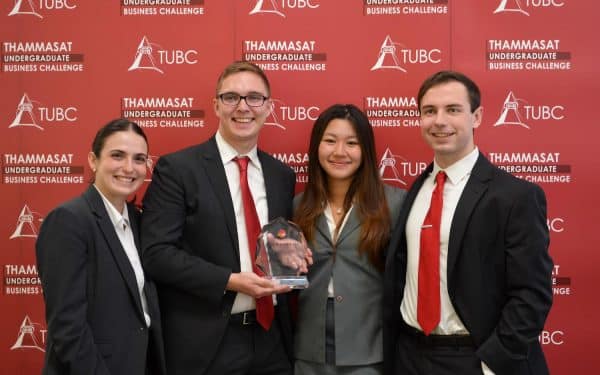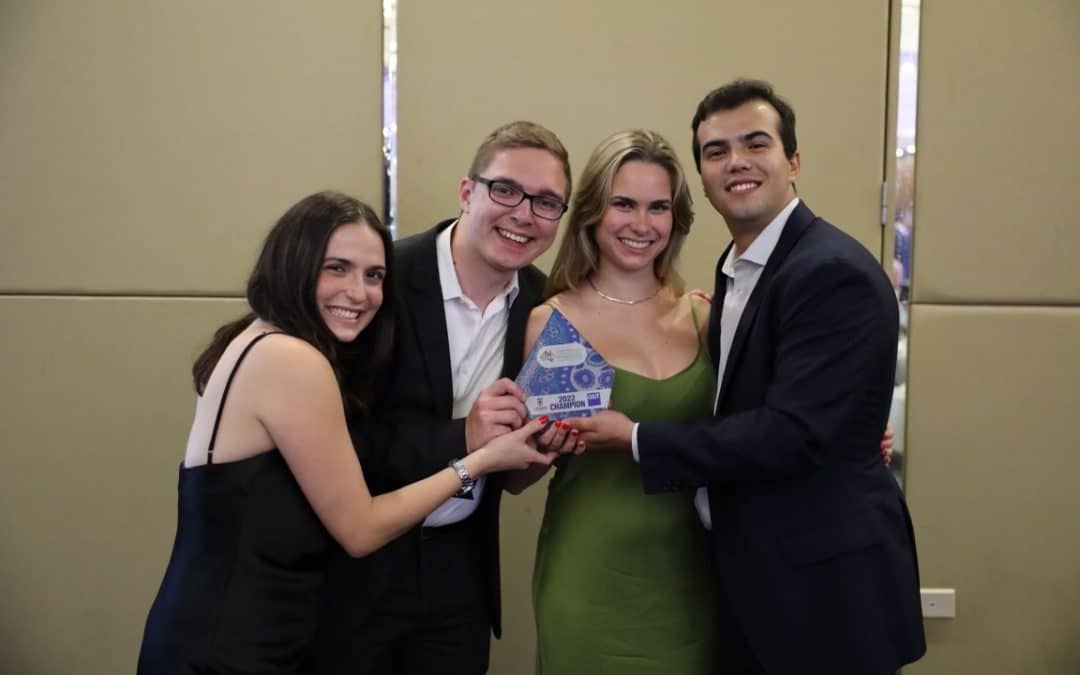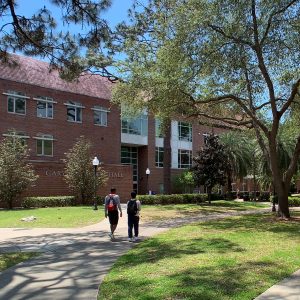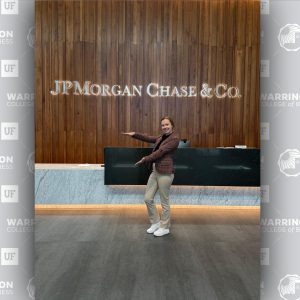Heavener International Case team places first and third in two international case competitions
With back-to-back wins in Thailand and Australia, the team closed out the fall season ready to ride the positive momentum into the Champions Trophy Case Competition.
The Heavener International Case Competition (HICC) team closed out its fall season with back-to-back trophies and a coveted spot to compete in the prestigious Champions Trophy Case Competition this spring.
The team competed in two international case competitions in the month of October. First up was the Thammasat Undergraduate Business Competition held in Bangkok, Thailand where the team placed third.
The team included Heavener students Luke Carter (BSBA ’23), Michael McCleskey (BSBA ’23), Jordana Schube (BSBA ’22, MS-Marketing ’23) and Beata Chen (BSBA ’23, MSF ’24). Carter and McCleskey served as team strategists, Schube served as analyst and created the final PowerPoint presentation and Chen was the team’s financial analyst.
As part of the 28-hour case, the team was asked to work with Great Wall Motors, a Chinese car company planning to enter the Thai market. With a focus on electric vehicles, the team was tasked with crafting a solution to help Great Wall Motors build brand trust in their new market. The team took a customer-journey approach, which focused on building trust in the pre-purchase, trial and post-purchase stages.
Overall, the case competition was a great learning experience for the team, and they plan to use many of the insights they gained in future competitions. For Carter, understanding a country’s culture and how it can impact strategy was paramount.
“For example, one of the most popular places for Thai people to spend time is in shopping malls,” Carter said. “We used this fact in our marketing campaign by focusing on the in-person aspect of the campaign in malls through digital billboards. Understanding the culture of the country is very important in future competitions as every solution needs to be adapted to fit that culture.”
For Chen, her biggest takeaway that she plans to use in future competitions is to view the key question from the company’s viewpoint.
“For example, when we had a Q&A session with the company, the CEO stated that one of the key issues that is preventing customer trust was because they are viewed as a foreign brand,” Chen said. “We used this fact in our marketing campaign by tailoring it to Thai consumers. This will help us in future case competitions because every effective solution should always be tailored to the company’s main needs.”
The team was proud to have done so well in the competition, especially Chen, who was competing in her first case competition.
“Placing third in this competition was such an awesome feeling for myself and the team,” she said. “I felt so ecstatic that we were able to apply all the skills and coaching that we learned from our practices, our vets who were on the case team previously, and finally our coach, Sean [Limon], to the TUBC competition. We couldn’t have done it without them and our extremely supportive team.”

Heavener students (from left) Jordana Schube, Luke Carter, Beata Chen and Michael McCleskey.
The trip also gave the students the opportunity to explore the city where the competition was held, which Carter noted was one of his favorite parts of the experience.
“[On excursion day] we were taken around all of Bangkok and got to experience real Thai culture,” he said. “This included a Pad-Thai cooking class, a Thai massage, Muay Thai kickboxing lesson, and getting to tour the Wat Arun Temple. This was a great experience for me as I got to see Bangkok and also really experience the culture of the city.”
The second competition was held about a week after the team returned from Bangkok. For this event, the team traveled back to the Asia-Pacific region to Sydney, Australia for the Australian Undergraduate Business Case Competition where they placed first.
The Australian team included Carter and Schube along with Kristina Smith (BSBA ’23) and Max Farfante (BSAc ’23, MAcc ’23). Carter and Schube continued in their roles as strategist and analyst and presentation creator, respectively, while Smith served as a strategist and Farfante was the team financial analyst.
This event included three cases, a three-hour, five-hour and 12-hour case, and all were focused on the Indigenous business community, as October is Indigenous Business Month in Australia. After sharing their recommendations for each case, the UF team came out on top of the other 15 competitors, including teams from the University of California – Berkeley, Indiana University, Copenhagen Business School and the National University of Singapore.
“First place in this competition was the culmination of long hours, hard work and preparation,” said Farfante. “Being able to justify all that time and energy with such a great accomplishment has invigorated me to keep pushing with maximum effort in my daily life.”
With the first-place win at the Australian Undergraduate Business Case Competition, the team would have secured its place to compete in the Champions Trophy Case Competition held in New Zealand in January 2023, but they had already qualified by winning the last Champions Trophy Case Competition.
The Champions Trophy Case Competition is often considered one of the preeminent case competitions for business students. Since the competition’s inception in 2008, teams from the University of Florida have taken home the coveted first-place trophy three times including in 2020, 2017 and 2015.
As the team begins its preparations for the next competition, they are using that same winning momentum to hopefully add a fourth first-place win to UF’s record. More importantly, though, the students are practicing the skills and gaining the experiences they will be able to utilize and draw from in their future careers.
“Participating on the HICC team has been the most transformational experience at my time in Warrington,” Carter said. “Being able to apply all the business knowledge I have learned through courses and internships on an international stage in a competition format has been life-changing. And all the competitions I have been in have allowed me to learn about new cultures and business styles as well as creating lifelong memories and friendships.”




